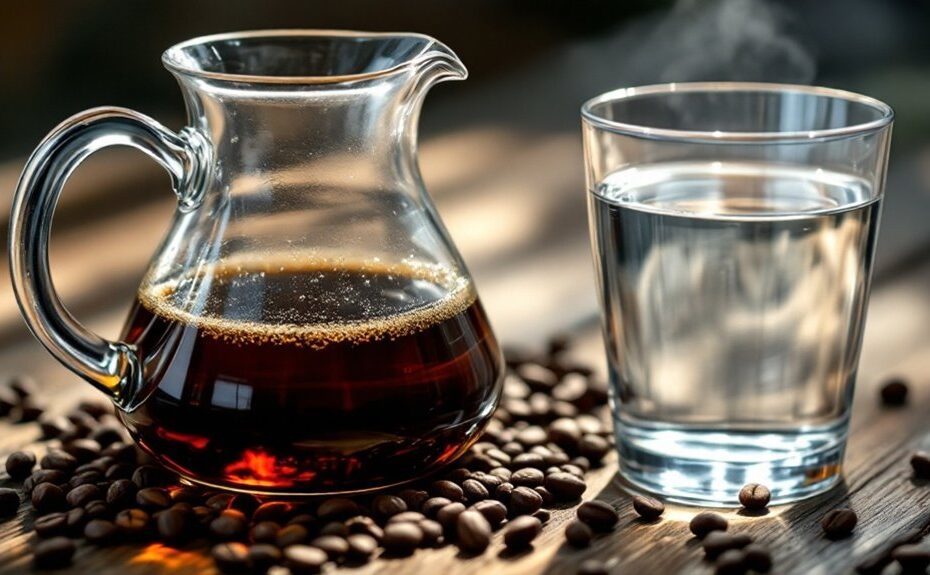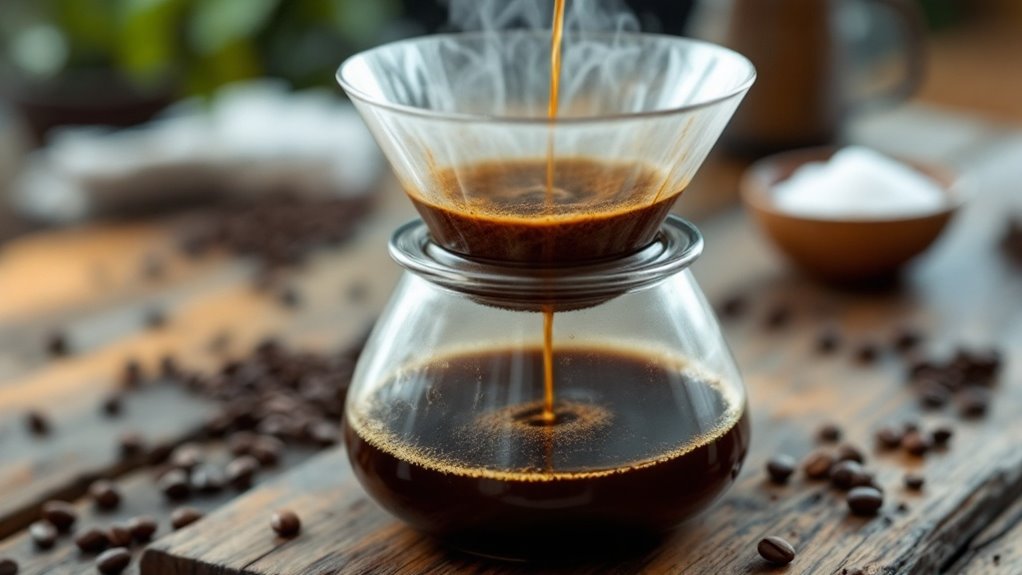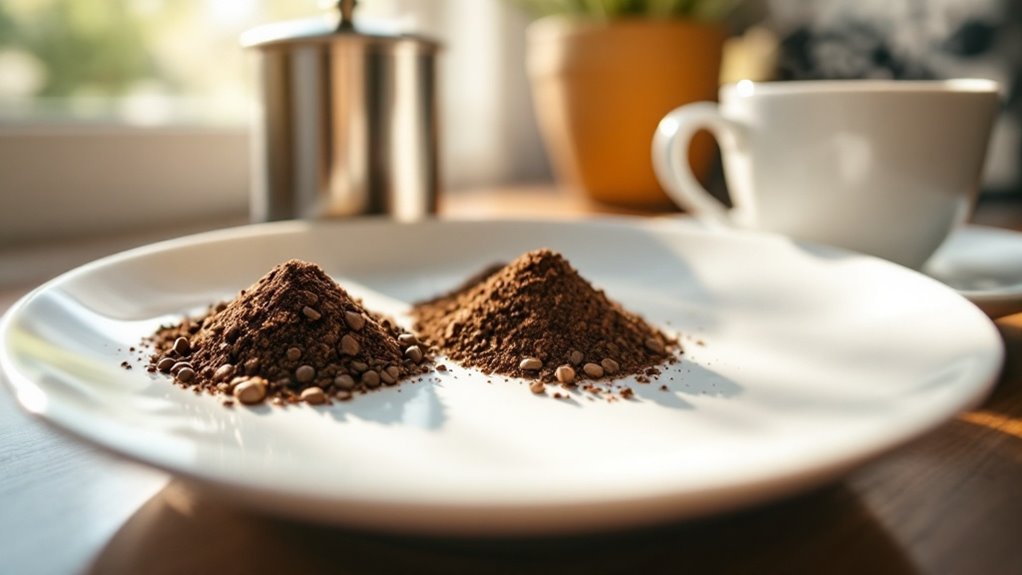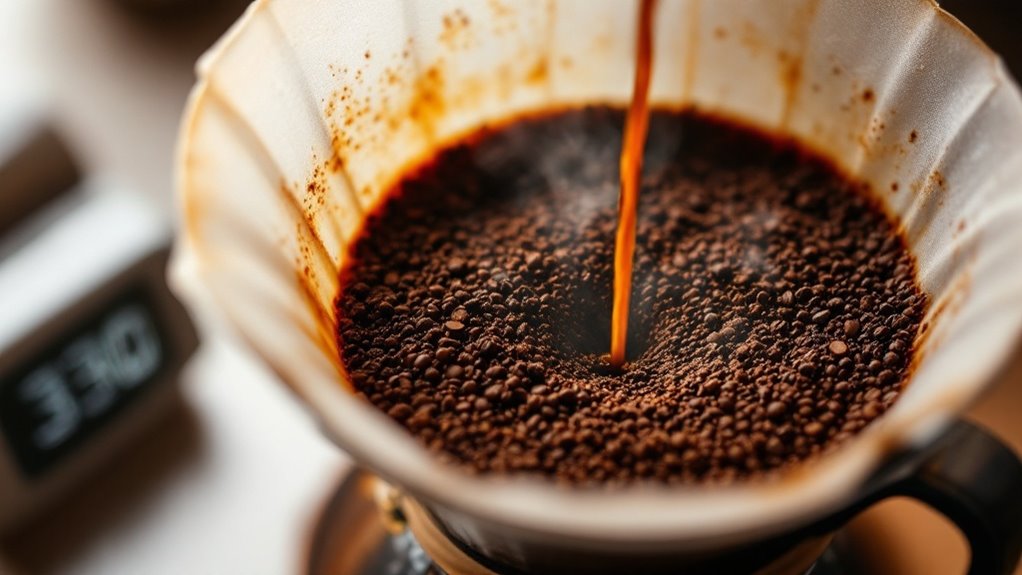







You might've heard that water quality can make or break your coffee, but is there truth to this claim? Since water makes up 98% of your brew, its composition directly influences how flavors are extracted from the beans. Minerals like calcium and magnesium enhance extraction, while impurities like chlorine can mask delicate notes. But what happens when the balance is off—too hard or too soft? The answer lies in how water interacts with coffee's chemistry, and understanding this could change the way you brew forever. What's in your water might just be the key to revealing your perfect cup.
Key Takeaways
- Water quality impacts flavor extraction; impurities like chlorine or excessive minerals distort coffee's natural taste.
- Balanced mineral content (60-120 ppm) enhances extraction, while too much or too little leads to bitter or flat coffee.
- Ideal water pH (6.5-7.5) ensures proper extraction; acidic or alkaline water causes under- or over-extraction, affecting taste.
- Hard water intensifies extraction but risks bitterness; soft water produces smoother coffee but may lack depth.
- Filtered or specialty water eliminates impurities and ensures consistent mineral content, improving coffee flavor and clarity.
The Role of Water in Coffee Brewing
Water plays a pivotal role in coffee brewing, as it makes up 98% of your cup. The water quality you use directly impacts the taste of coffee, influencing how effectively flavor extraction occurs. When brewing, water acts as a solvent, dissolving compounds from the coffee grounds to create the final beverage. If your water contains impurities, such as chlorine or excessive minerals, it can mask or distort the natural flavors, leading to a bitter or dull taste. Conversely, water with balanced mineral content, particularly calcium and magnesium, enhances extraction by interacting with coffee compounds more effectively.
Water temperature is equally critical. For ideal flavor extraction, you should maintain a temperature between 195°F and 205°F. Too hot, and you risk over-extraction, resulting in bitterness; too cold, and under-extraction leaves your coffee tasting weak and flat. Additionally, water with a pH between 6.5 and 7.5 guarantees balanced extraction, preserving the coffee's nuanced flavors. By prioritizing water quality and controlling water temperature, you directly influence the clarity, complexity, and overall enjoyment of your coffee.
How Minerals in Water Influence Flavor
The mineral content in your water directly impacts coffee flavor by influencing extraction efficiency and taste balance. Hard water, rich in calcium and magnesium, enhances extraction and can highlight fruity notes in darker roasts, while soft water often leads to under-extraction and a flat profile. Striking a balance, with around 150 ppm TDS, guarantees ideal flavor without overpowering the coffee's natural characteristics.
Mineral Content Impact
When brewing coffee, the mineral content in your water plays a pivotal role in shaping the final flavor. Calcium and magnesium, two key minerals, enhance the extraction of soluble compounds from coffee grounds, directly influencing taste. Hard water, with over 120 ppm of calcium carbonate, can intensify fruity notes in darker roasts but risks overpowering lighter roasts due to over-extraction. Conversely, soft water, containing less than 60 ppm of calcium carbonate, often results in flat or dull flavors because it lacks the necessary minerals for effective extraction. The ideal water for coffee brewing strikes a balance, with 60-120 ppm of calcium carbonate, ensuring ideal mineral extraction without overwhelming the coffee's natural profile. Excessive minerals in hard water can lead to bitterness, masking subtle flavors, while insufficient minerals in soft water fail to release the coffee's full potential. By understanding how mineral content interacts with your brew, you can tailor your water to achieve a balanced, flavorful cup.
Hard Vs Soft Water
Hard and soft water each bring distinct characteristics to your coffee, directly shaping its flavor profile. Hard water, with its high mineral content of calcium and magnesium, enhances extraction, often intensifying bitterness and altering the coffee's natural flavors. While this can add depth, excessive water hardness—above 175 ppm—can overpower the brew, creating an unbalanced taste. Additionally, hard water leads to scale buildup in your coffee machine, reducing its efficiency and consistency over time. On the other hand, soft water, low in minerals, produces a smoother, less acidic cup but risks under-extraction, resulting in a flat or dull flavor profile if the mineral content is too low. The ideal water hardness for brewing falls between 50-175 ppm, striking a balance that allows for ideal flavor extraction without overwhelming the coffee. Soft water is gentler on equipment, preventing scale buildup, but may lack the complexity that calcium and magnesium contribute. Understanding the interplay between hard or soft water and its mineral content guarantees you achieve the desired flavor profile in every cup.
Hard Water vs. Soft Water for Coffee
Hard water, rich in calcium and magnesium, enhances extraction but risks over-extraction, leading to bitter or chalky notes in your coffee. Soft water, with fewer minerals, often produces a smoother, more balanced flavor but may under-extract, resulting in a weaker cup. Striking the right mineral balance, typically between 50-150 ppm, guarantees ideal extraction and flavor without compromising your coffee's taste or your machine's longevity.
Mineral Content Impact
The mineral content in your water can make or break your coffee's flavor profile. Hard water, with high levels of calcium and magnesium (over 120 ppm), enhances extraction by interacting with coffee compounds, but it can also amplify bitterness, especially in lighter roasts. These minerals act as catalysts, pulling out more flavors and oils, which can overpower delicate, acidic notes. On the other hand, soft water, with low mineral content (below 60 ppm), struggles to extract effectively, resulting in a flat or dull cup. It lacks the necessary calcium and magnesium to fully engage with the coffee grounds, leaving darker roasts tasting less robust and nuanced. Moderately hard water (60-120 ppm) strikes an ideal balance, offering enough minerals to extract flavors without overwhelming the brew. Hard water tends to accentuate fruity notes in darker roasts but may clash with lighter roasts' subtleties. Soft water, while gentler, often fails to deliver the depth and complexity needed for a satisfying cup, particularly with darker roasts. Your water's mineral content directly influences extraction, shaping the final taste of your coffee.
Flavor Extraction Differences
When brewing coffee, the type of water you use plays a pivotal role in how flavors are extracted from the grounds. Hard water, with its high mineral content, enhances the extraction of certain flavor compounds, particularly in darker roasts. The calcium and magnesium in hard water (over 120 ppm) can amplify fruity and bold notes, but they may also accentuate bitterness, especially in lighter roasts, where delicate flavors risk being overpowered. Conversely, soft water (below 60 ppm) lacks sufficient minerals to effectively extract flavor compounds, often resulting in a flat or dull taste. This under-extraction can leave your coffee lacking complexity, particularly in darker roasts. For lighter roasts, however, soft water allows subtle flavor nuances to shine without interference from excessive minerals. The ideal water hardness for balanced extraction falls between 60-120 ppm, ensuring ideal flavor without over-extraction or bitterness. By understanding how water affects coffee taste, you can tailor your brewing process to highlight the best qualities of your beans, whether you prefer bold, fruity notes or delicate, nuanced flavors.
The Impact of Water Ph on Coffee Taste
You might not realize it, but the pH of your water plays a crucial role in how your coffee tastes. Water pH directly influences flavor extraction, determining whether your coffee is balanced, bitter, or flat. For ideal results, your water should have a pH between 6.5 and 7.5. If the water is too acidic (below 6.5), it under-extracts the coffee's soluble compounds, leaving you with a weak, underdeveloped brew. On the other hand, alkaline water (above 7.5) over-extracts bitter compounds, creating an unpleasant, harsh taste. Neutral or slightly alkaline spring water is perfect, as it extracts the coffee's natural flavors without overpowering them. Extreme pH levels, whether highly acidic or alkaline, can mute the coffee's delicate aromas and nuances, making it taste dull or overly sharp. By ensuring your water pH falls within the recommended range, you'll achieve a well-rounded cup that highlights the coffee's intended profile. Paying attention to this detail can transform your brewing experience, allowing you to enjoy the full complexity of your coffee.
Tap Water and Its Effect on Coffee
Tap water's composition substantially influences the taste of your coffee, often in ways that can detract from its intended flavor profile. The quality of water you use directly affects the taste, as tap water typically contains varying levels of chlorine and mineral buildup. Chlorine, commonly added to municipal water supplies, can impart a chemical or metallic aftertaste, masking the nuanced flavors of your coffee. Similarly, hard tap water, rich in calcium and magnesium, often leads to over-extraction, resulting in a bitter or astringent brew. On the other hand, soft tap water, with fewer minerals, may under-extract the coffee, producing a flat or dull cup. The inconsistency in tap water quality across regions further complicates matters, making it difficult to achieve a consistent flavor profile. Mineral buildup in your brewing equipment can also accumulate over time, altering the taste of subsequent batches. To guarantee your coffee tastes as intended, it's vital to take into account the quality of water you're using and how its composition might affect the final brew.
Benefits of Using Filtered Water
Filtered water greatly enhances the quality of your coffee by eliminating chlorine, impurities, and inconsistent mineral content that can distort its flavor. When you use filtered water to make coffee, you guarantee the quality of the water is neutral in pH, which is critical for balanced extraction. This allows the natural flavors and aromas of your coffee beans to shine without interference from contaminants. Filtered water also maintains an ideal total dissolved solids (TDS) concentration of around 150ppm, which is ideal for brewing high-quality coffee. By removing chlorine and other impurities, you prevent off-flavors that can dull the taste of your coffee, guaranteeing a cleaner, more vibrant cup. Additionally, using filtered water to brew coffee reduces mineral buildup in your coffee machine, extending its lifespan and lowering maintenance costs. Consistency is key to achieving the perfect coffee, and filtered water provides a reliable base every time. Whether you're a casual drinker or a coffee enthusiast, investing in filtered water guarantees your brew is always at its best.
Distilled and Reverse Osmosis Water in Brewing
While filtered water provides a balanced foundation for brewing, distilled and reverse osmosis (RO) water present unique challenges and opportunities in coffee preparation. Distilled water, stripped of all minerals, can lead to under-extraction, resulting in a flat and dull flavor from your coffee grounds. Similarly, Reverse Osmosis water removes 95-99% of dissolved solids, creating a clean but potentially bland taste. Both water sources lack the mineral content necessary to interact effectively with coffee compounds, which can disrupt the brewing process and produce an imbalanced pH, affecting acidity and overall flavor. However, these purified waters offer a blank slate for customization. By adding mineral packets, you can replicate ideal brewing conditions, enhancing extraction and achieving a more nuanced flavor profile. Many specialty coffee enthusiasts prefer using distilled or RO water as a base because it allows for precise control over water composition, ensuring consistency in every perfect cup of coffee. When used thoughtfully, these water sources can elevate your brewing process, but neglecting remineralization risks compromising the final result.
Water Temperature and Extraction Efficiency
Water temperature plays a critical role in determining the efficiency of coffee extraction and the resulting flavor profile. When brewing, maintaining water between 195°F and 205°F guarantees ideal extraction from your coffee beans. If the water is too cold (below 195°F), it won't dissolve enough compounds, leading to under-extraction and a weak, sour cup. Conversely, water above 205°F can over-extract, pulling out bitter and astringent flavors that overshadow the coffee's natural qualities. Consistency is key—fluctuating temperatures disrupt the balance, resulting in an uneven brew. Preheating your brewing equipment helps stabilize the temperature, securing a more controlled extraction process. The quality of your final cup of coffee hinges on this precision, as even the best coffee beans can't compensate for improper brewing conditions. By carefully managing water temperature, you maximize the extraction of desirable flavors while minimizing unwanted bitterness, achieving a well-rounded and satisfying brew every time.
Experimenting With Water for Optimal Coffee Flavor
To achieve the best coffee flavor, experimenting with water composition is as essential as selecting the right beans. Start by testing different types of water, such as filtered tap water, spring water, or distilled water with added minerals. Each type of water used can markedly alter the extraction process, influencing acidity, sweetness, and body. Aim for water hardness levels between 60-120 ppm to balance mineral content, as low mineral content can lead to under-extraction, while excessive minerals may over-extract bitter compounds. Adjust the pH of your water to 6.5-7.5 to avoid extremes that dull or intensify flavors. Compare hard water (over 120 ppm) and soft water (below 60 ppm) to see how they affect fruity, smoky, or bold notes in your brew. For consistency, consider using Third Wave Water mineral packets, which are tailored to light or dark roasts. By systematically varying the water used, you'll identify the ideal composition that enhances your preferred coffee profile, ensuring every cup is optimized for flavor.
Disclosure: As an Amazon Associate, I earn from qualifying purchases.






